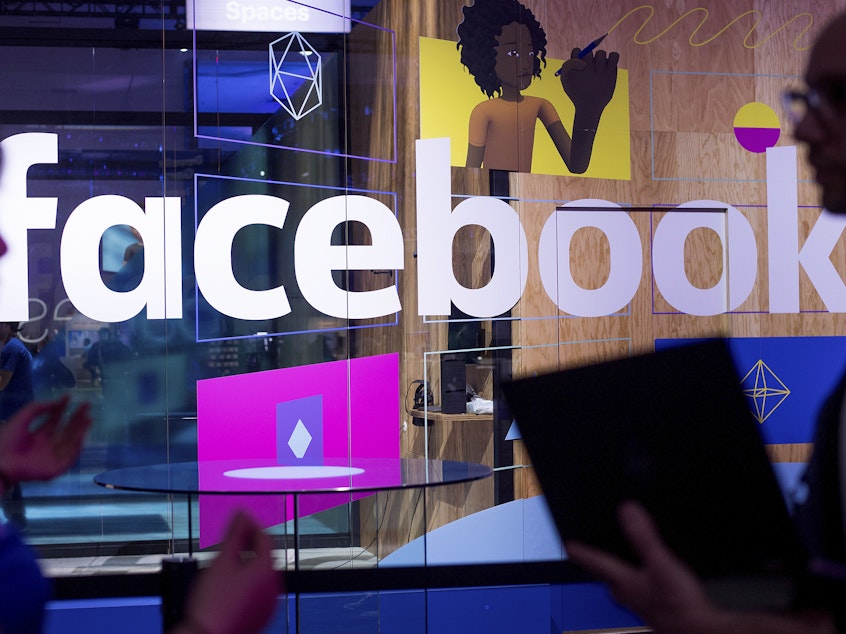Facebook Allowed Employers To Exclude Women From Job Ads, ACLU Says

Facebook became embroiled in another controversy Tuesday, after the American Civil Liberties Union accused the company of giving employers a powerful tool to discriminate against women seeking work.
The complaint alleges that Facebook allowed employers to target job ads exclusively to men — that "they're profiting from thousands of ads that are being hidden from women," civil rights lawyer Peter Romer-Friedman of Outten & Golden told NPR.
Three women, from Pennsylvania, Ohio and Illinois, came forward on behalf of female and non-male Facebook users. They said in the complaint that they were denied certain job opportunities because they never saw the ads. Many of the postings, like those for mechanics or truck drivers, were in male-dominated fields.
The complaint was filed with the Equal Employment Opportunity Commission by the ACLU, Outten & Golden and labor union Communications Workers of America.
The lawyers said that practice violates Title VII of the Civil Rights Act of 1964, which makes discrimination based on sex illegal.
"The only difference between Facebook's ad targeting practice and the sex-segregated classified ads of yore is that Facebook — unlike newspapers, which are distributed to the general public — can actually ensure that specific ads are only delivered to its male or female users," ACLU senior staff attorney Galen Sherwin said in a statement.
"The discrimination is always lurking below the surface," Romer-Friedman said. "Here we have evidence that employers never really abandoned the practice but because of their own stupidity and Facebook's transparency in the job ads, we know now this is a systemic problem."
Facebook also excluded women from its own company, the complaint charged. It said Facebook uses its "Lookalike Feature," which searches for demographic similarities in customer bases, "in its own recruiting for positions at Facebook" which results in "discrimination against women in Facebook's own recruiting and hiring."
In a statement emailed to NPR, Facebook spokesman Joe Osborne said, "There is no place for discrimination on Facebook; it's strictly prohibited in our policies, and over the past year, we've strengthened our systems to further protect against misuse." Osborne added that staff are reviewing the complaint and "look forward to defending our practices."
The company plans to require all advertisers to comply with Facebook's anti-discrimination policies and the law.
Ten employers who were named in the complaint included the City of Greensboro Police Department in North Carolina, software developer Abas USA and Renewal by Andersen, a large window replacement company.
"The ten we identified today in the charges are, we think, a sample of the much larger numbers of employers that have done this," Romer-Friedman said.
All three employers denied that they excluded women from job opportunities when contacted by NPR.
Adam May, a spokesman for Renewal by Andersen, said in an emailed statement that its primary focus was to build a talented and dedicated team, "regardless of who those folks might be." He added, "We are an equal opportunity employer, and we are proud of the diversity of our workforce. We will not be commenting on specifics of this case."
Josh Salton, a spokesman for Abas USA, told NPR by email that he was unable to respond to any of the specific allegations but that the company is an equal opportunity employer and "we do not discriminate in our hiring practices or in the terms and conditions of our employment."
The Greensboro Police Department's public information officer, Ron Glenn, told NPR, "Basically, Facebook is one channel of an extensive recruiting strategy for the Greensboro Police Department. We are committed to seeking and hiring an inclusive and diverse work force. We adhere to our city's policy of diversity and inclusion."
In August, Facebook announced that it was doing away with "5,000 targeting options" that related to ethnicity, religion and other attributes. Earlier that month, Housing and Urban Development Secretary Ben Carson accused Facebook of engaging in housing discrimination.
It followed a ProPublica report in 2016 which showed how users could buy housing ads based on "ethnic affinity," preventing black, Hispanic and other groups from seeing ads. The publication also reported last year that it purchased rental housing ads that excluded African Americans, Jewish people, Spanish speakers and other groups.
Civil rights attorney Romer-Friedman said that while Facebook had made some changes to prevent racial and religious discrimination, he believed the company left the gender option in ads because it is a powerful digital marketing and microtargeting tool that benefits advertisers. "We know now that this is a leadership problem, from the top down. This is not a technical problem. They could solve this in an afternoon."
Romer-Friedman said he is hopeful and confident that the Equal Employment Opportunity Commission will take action, even though it receives thousands of complaints and only a fraction moves forward as lawsuits.
If the federal agency doesn't take on the case, Romer-Friedman said, the ACLU can. [Copyright 2018 NPR]

